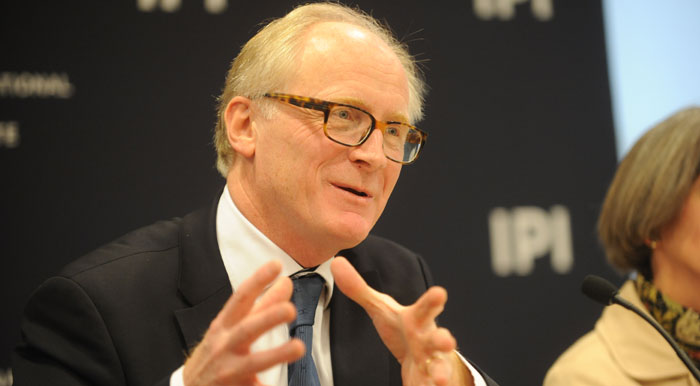 “There is no other way. The United States, or NATO, or anybody else international, cannot make peace in Afghanistan,” Kai Eide, the Special Representative of the Secretary-General for Afghanistan from March 2008-2010, told an IPI policy forum on January 26, 2012. “We can address some of the components perhaps, but peace in Afghanistan can only be made by the Afghans themselves, and therefore the Afghan government has to be brought on board.”
“There is no other way. The United States, or NATO, or anybody else international, cannot make peace in Afghanistan,” Kai Eide, the Special Representative of the Secretary-General for Afghanistan from March 2008-2010, told an IPI policy forum on January 26, 2012. “We can address some of the components perhaps, but peace in Afghanistan can only be made by the Afghans themselves, and therefore the Afghan government has to be brought on board.”
Eide was reflecting on his two-year term in Kabul, outlined in his newly-released memoir of the period, Power Struggle Over Afghanistan: An Inside Look at What Went Wrong—and What We Can Do to Repair the Damage.
Speaking about recent moves towards reconciliation between the Taliban insurgents and Afghan government and international forces, Ambassador Eide said, “In early 2008, I said there has to be a political process, and we have to involve the Taliban leadership… I am very pleased to see that, although it has taken quite some time, this is what almost all of us think now.” He added, “We are in the very early stages, and we don’t know if it will succeed or not.”
The most important element hurting international community efforts in Afghanistan, he said was “Our lack of ability to understand Afghan society, the Afghan government and its leaders, in particular President Karzai.” Addressing criticism that the Afghan president often receives, Eide said, “He is not a man who seeks solutions the way we would expect from our perspective. It’s a man who is deeply rooted in the Afghan tradition, and we tend to ignore it, as a basic mistake.” Eide also explained that he felt the international community did not adequately support Karzai initially, when there were no institutions or security forces for his new government to project its power across the country.
Ambassador Eide was tasked with coordinating international civilian assistance as the head of the United Nations Assistance Mission in Afghanistan (UNAMA), which he called an “impossible task”, citing the lack of information from donors about where they were directing their aid. He asked, “How can you coordinate if there are no priorities? You coordinate around a set of priorities.”
He was also critical of the international community’s “tendency to focus on rather short, quick-impact projects…that were not sustainable, many of them, and the Afghan government, particularly its Finance Minister said ‘please engage in sustainable development.’” Eide said, “The Afghans had to move out of the aid dependency situation they were in. They are still there.”
“I don’t want the UN to coordinate assistance. I want the Afghans to do it. I think they are better placed. I think it was wrong to say the UN should do it.” He continued, “We will do it for a brief period and hand it over. Why not hand it over now? We are saying, ‘the Afghans are not mature.’ Well then, how will they become mature? By doing it, of course.”
Ambassador Eide also cited what he saw as a civil-military power struggle in, “the military, building up their forces, becoming more impatient, wanted to have the civilians on board—as an appendix—to an increasingly militarized strategy.” However, he said, NGOs cannot be seen as “being part of the battle. They need to be able to move freely, as freely as possible in a difficult security situation.”
On corruption, Eide said that “We have to admit that both international community and the Afghans are involved in projects that amount also to corruption. We do not have the sufficient accountability and control mechanisms with all the money that flows in.” He said, “I think there is grand scale corruption on both sides”. A $10 bribe by an Afghan official is “not petty corruption for a family with $60 in income. It’s felt and it angers the local population.”
On the other hand, “Karzai also believes that some of our practices, that we don’t see as corruption, is corruption. When an expert is hired, an expert from a Western country, and paid $500-600,000 a year, and he sits next to an Afghan who earns $1500 a year, this is seen as corruption by the Afghans. It is seen as a kind of corruption when we have a technical agreement between ISAF and the government which allows the commander of ISAF to determine who should be tax exempt…they see this as corruption.”
On the role of the international community going forward, he said that “We have to help bring about a national consensus in Afghanistan. It does not exist today.”
“We have lost a lot of time. A lot of time. Can we regain it? I do hope so. I take some comfort from seeing that the basics here now, which is to put the Afghans in the lead, to engage in a reconciliation dialogue with the insurgency, those are elements that we all agree on.”
Moderating the event was Ambassador Maureen Quinn, IPI Senior Adviser.
Interview with Kai Eide, Former SRSG for Afghanistan >>
Watch video of event:







